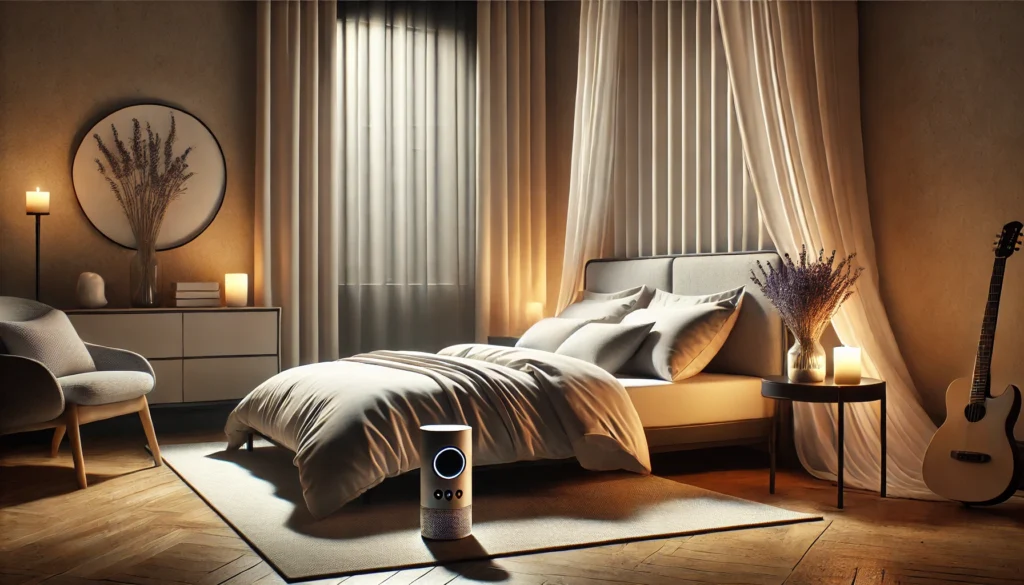In our fast-paced world, sleep often takes a backseat to productivity and social obligations. Yet, sleep is a cornerstone of health and wellness, influencing everything from cognitive function to emotional stability. Enter the Fitbit Charge 6, a tool designed not only to track your daily steps but to revolutionize your sleep quality. Let’s delve into how this device can enhance your sleep and, by extension, your life.
You May Also Like: Ultimate Guide to Sleep Tracker Apps
Understanding the Importance of Sleep
Before we explore how the Fitbit Charge 6 can aid in improving sleep, it’s essential to understand why sleep is so crucial. Sleep is a restorative process, allowing the body to repair itself, consolidate memories, and regulate hormones. Lack of quality sleep has been linked to a myriad of health issues, including obesity, heart disease, and mental health disorders.
The Science Behind Sleep
Sleep occurs in cycles, primarily divided into REM (Rapid Eye Movement) and non-REM stages. Each stage plays a vital role in overall health. For instance, non-REM sleep is when most of the body’s repair processes occur, while REM sleep is critical for cognitive functions like memory and creativity. Understanding these stages helps us appreciate how disruptions can affect our waking hours.
Moreover, the sleep cycle’s structure is designed to optimize both physical and mental recovery. Non-REM sleep promotes physical healing, while REM sleep supports emotional regulation and memory consolidation. Inadequate sleep disrupts this balance, leading to impaired cognitive and physical performance during the day.
As technology and research expand our understanding, we can better appreciate the nuanced role each sleep stage plays. This knowledge empowers us to make informed decisions about improving sleep quality and overall health.
The Impact of Sleep Deprivation
Chronic sleep deprivation is a silent epidemic affecting millions worldwide. It has been linked to increased risks of chronic illnesses such as diabetes and hypertension. Over time, lack of sleep can weaken the immune system, making individuals more susceptible to infections and diseases.
Sleep deprivation also affects mental health, contributing to depression, anxiety, and mood disorders. It impairs cognitive functions, including attention, decision-making, and problem-solving skills, which can lead to accidents and decreased productivity at work or school.
Moreover, insufficient sleep impacts emotional regulation, leading to increased irritability and stress. Addressing sleep deprivation is crucial for maintaining overall well-being and enhancing quality of life.
Common Sleep Disorders
Many individuals suffer from sleep disorders such as insomnia, sleep apnea, and restless leg syndrome, which can severely impact sleep quality. Understanding these disorders can be the first step toward addressing them effectively.
Insomnia, characterized by difficulty falling or staying asleep, is one of the most prevalent sleep disorders. It can be triggered by stress, anxiety, or unhealthy sleep habits. Recognizing and addressing these triggers is vital for managing insomnia and improving sleep quality.
Sleep apnea, another common disorder, involves interrupted breathing during sleep, leading to frequent awakenings and poor sleep quality. It often goes undiagnosed, but symptoms like loud snoring and daytime fatigue can be warning signs. Seeking medical advice and exploring treatment options are essential steps for those affected.
Restless leg syndrome, marked by an uncontrollable urge to move the legs, can cause discomfort and disrupt sleep. Identifying potential causes, such as iron deficiency or medication side effects, can help manage this condition and improve overall sleep quality.

The Role of Fitbit Charge 6 in Sleep Tracking
The Fitbit Charge 6 isn’t just a fitness tracker; it’s a comprehensive health tool that can significantly enhance your understanding of sleep patterns. By leveraging its advanced technology, users can gain insights into their sleep habits and make informed decisions to improve them.
How Fitbit Charge 6 Monitors Sleep
Fitbit Charge 6 uses a combination of heart rate monitoring, motion detection, and even skin temperature to provide a detailed analysis of your sleep stages. This data is then used to generate a Sleep Score, which gives a comprehensive overview of your sleep quality each night.
Heart rate variability is a key indicator of sleep stages. The Fitbit Charge 6 tracks subtle changes in your heart rate to distinguish between light, deep, and REM sleep. This information allows for a more accurate assessment of sleep quality and potential disturbances.
Motion detection helps identify periods of restlessness or wakefulness during the night. By analyzing movement patterns, the device can offer insights into how often you wake up and how long it takes to fall back asleep.
Skin temperature is another valuable metric, offering insights into your body’s circadian rhythm. Fluctuations in skin temperature can indicate changes in sleep environment or potential disruptions, allowing for adjustments to improve sleep quality.
Features of Fitbit Charge 6 for Sleep Optimization
- Sleep Stages Breakdown: Offers insights into how much time you spend in light, deep, and REM sleep.
- Smart Wake: Uses machine learning to wake you during the optimal sleep stage, helping you feel more refreshed.
- Sleep Mode: Reduces interruptions by silencing notifications and dimming the display at night.
The Sleep Stages Breakdown feature provides a detailed view of your night’s rest, highlighting time spent in each stage. This information helps users identify patterns and make necessary adjustments to improve sleep quality.
Smart Wake ensures you wake up feeling more alert and refreshed by timing your alarm to go off during a lighter sleep stage. This feature can significantly reduce grogginess and improve morning energy levels.
Sleep Mode is designed to create a distraction-free environment by minimizing disruptions from notifications and screen brightness. This feature promotes a more restful sleep by allowing you to focus on relaxation and restoration.
Additional Features Enhancing Sleep Tracking
- Sleep Insights: Personalized recommendations based on your sleep data to help you improve sleep quality.
- Silent Alarms: Vibrations gently wake you without disturbing your partner.
- Sleep Logging: Manual logging feature allows for tracking naps or irregular sleep patterns.
Sleep Insights provide tailored advice based on your unique sleep patterns, guiding you toward better sleep habits. These insights can include recommendations for bedtime routines or environmental adjustments.
Silent Alarms offer a discreet way to wake up, ensuring your partner’s sleep remains undisturbed. This feature is particularly useful for couples with different schedules or sleep preferences.
Sleep Logging allows users to manually record naps or irregular sleep patterns, providing a comprehensive view of overall sleep habits. This feature helps identify areas for improvement and track progress over time.
Maximizing Sleep Quality with Data Insights
Harnessing the data provided by the Fitbit Charge 6 can be transformative in enhancing sleep quality. Here’s how you can use these insights to your advantage:
Identifying Sleep Patterns
By consistently tracking your sleep, you can identify patterns and correlations between your daily habits and sleep quality. This information is invaluable for making lifestyle adjustments, such as modifying your exercise routine or diet.
Analyzing sleep data over time can reveal trends, such as improved sleep quality on days with more physical activity. Understanding these correlations allows you to make informed decisions about integrating exercise into your daily routine.
Monitoring sleep patterns can also highlight the impact of diet on sleep quality. Identifying foods or beverages that disrupt sleep can guide dietary changes, promoting better rest and overall health.
Recognizing how stress affects sleep patterns can lead to implementing stress-reduction techniques, such as mindfulness or relaxation exercises, to enhance sleep quality and mental well-being.
Creating a Sleep-Friendly Environment
The data from your Fitbit can guide changes in your sleep environment. For instance, if you’re spending too little time in deep sleep, consider optimizing your bedroom for tranquility—think blackout curtains, white noise machines, or a cooler room temperature.
Creating a serene sleep environment is essential for promoting restful sleep. Consider decluttering your bedroom to create a calming space that encourages relaxation and reduces stress.
Temperature plays a crucial role in sleep quality. Maintaining a cool, comfortable room temperature can enhance deep sleep and prevent nighttime awakenings.
Incorporating elements like blackout curtains and white noise machines can further optimize your sleep environment. These tools help minimize disturbances from light and sound, creating a more conducive atmosphere for restful sleep.
Setting Realistic Sleep Goals
Utilize the Sleep Score to set and achieve realistic sleep goals. Incremental changes, informed by data, can lead to significant improvements in overall sleep quality over time.
Setting achievable sleep goals based on your Sleep Score allows for gradual improvements in sleep habits. Start by aiming for an additional 15-30 minutes of sleep per night and gradually increase as needed.
Tracking progress toward sleep goals helps maintain motivation and accountability. Celebrate small victories along the way, recognizing the positive impact of improved sleep on daily life.
Adjust sleep goals as needed based on changes in lifestyle or health status. Flexibility in goal-setting ensures continued progress and adaptation to evolving needs.
Leveraging Data for Personalized Strategies
- Identify stressors impacting sleep and implement stress-reduction techniques.
- Adjust bedtime routines to align with optimal sleep times.
- Monitor changes in sleep quality in response to lifestyle modifications.
Analyzing sleep data can help identify stressors that impact sleep quality. Implementing stress-reduction techniques, such as meditation or deep-breathing exercises, can enhance relaxation and promote restful sleep.
Adjusting bedtime routines based on optimal sleep times identified through data analysis can improve sleep efficiency. Establishing consistent sleep and wake times helps regulate the body’s internal clock and enhances overall sleep quality.
Monitoring changes in sleep quality in response to lifestyle modifications, such as increased physical activity or dietary adjustments, provides valuable feedback. This information guides further refinements to optimize sleep habits and promote well-being.

Practical Tips for Better Sleep
While the Fitbit Charge 6 provides valuable insights, it’s essential to incorporate practical strategies for sleep improvement:
Establish a Routine
A consistent sleep schedule reinforces your body’s natural circadian rhythm. Aim to go to bed and wake up at the same time every day, even on weekends.
Consistency in sleep schedules helps regulate the body’s internal clock, promoting better sleep quality and overall health. Sticking to a regular schedule, even on weekends, reinforces this rhythm and prevents disruptions.
Developing a pre-sleep routine can signal the body that it’s time to wind down. Activities like reading, taking a warm bath, or practicing relaxation exercises can help transition into a restful state.
Gradually adjusting bedtime and wake-up times allows for a smoother transition to a new sleep schedule. Small changes, such as shifting bedtime by 15 minutes each night, can ease the adjustment process.
Limit Screen Time
The blue light emitted by screens can disrupt melatonin production, making it harder to fall asleep. Consider setting your devices to “night mode” or using apps that filter blue light.
Limiting screen time before bed is crucial for promoting restful sleep. Reducing exposure to blue light from devices helps maintain melatonin production, a hormone essential for sleep regulation.
Setting devices to “night mode” or using blue light filters can minimize the impact of screens on sleep quality. These tools adjust screen brightness and color temperature, reducing blue light exposure.
Establishing a screen-free zone in the bedroom can further enhance sleep quality. Keeping devices out of reach reduces the temptation to check notifications or browse the internet late at night.
Mind Your Diet
Avoid heavy meals, caffeine, and alcohol close to bedtime. These can interfere with your ability to fall and stay asleep.
Diet plays a significant role in sleep quality. Avoiding heavy or spicy meals close to bedtime can prevent discomfort and indigestion, promoting better rest.
Caffeine and alcohol can disrupt sleep patterns, reducing sleep quality and leading to nighttime awakenings. Limiting consumption in the hours leading up to bedtime supports more restful sleep.
Incorporating sleep-promoting foods, such as those rich in magnesium or tryptophan, into your diet can enhance sleep quality. Consider snacks like almonds, bananas, or warm milk before bed for a natural sleep aid.
Engage in Relaxation Techniques
Practices such as yoga, meditation, or deep-breathing exercises before bed can reduce stress and promote relaxation, preparing your body for sleep.
Incorporating relaxation techniques into your bedtime routine can significantly improve sleep quality. Activities like yoga or gentle stretching help release physical tension and prepare the body for rest.
Meditation and mindfulness practices promote mental relaxation, reducing stress and anxiety that can interfere with sleep. Regular practice enhances overall well-being and supports restorative sleep.
Deep-breathing exercises can induce a state of calm, lowering heart rate and promoting relaxation. Focusing on slow, deep breaths before bed can ease the transition into sleep.
Incorporate Mindfulness for Better Sleep
- Practice gratitude journaling before bed to focus on positive thoughts.
- Use guided sleep meditations to calm the mind and body.
- Explore aromatherapy with calming scents like lavender or chamomile.
Gratitude journaling before bed can shift focus to positive thoughts, reducing stress and promoting relaxation. Reflecting on positive aspects of the day enhances emotional well-being and supports restful sleep.
Guided sleep meditations provide structured relaxation exercises that calm the mind and body. These meditations often include visualizations or body scans to ease the transition into sleep.
Aromatherapy with calming scents like lavender or chamomile can enhance relaxation and improve sleep quality. Incorporating essential oils or scented candles into your bedtime routine creates a soothing environment conducive to rest.
Future Implications of Sleep Tracking Technology
The future of sleep technology is promising, with devices like the Fitbit Charge 6 leading the way. As technology advances, we can anticipate even more personalized and precise sleep recommendations, potentially integrating with home automation systems to create the ultimate sleep-friendly environment.
The Evolution of Sleep Technology
Wearable technology continues to evolve, with potential developments including real-time health monitoring and integration with healthcare providers for personalized medical advice.
Advancements in wearable technology offer exciting possibilities for sleep tracking. Future devices may incorporate real-time health monitoring, providing instant feedback on sleep quality and overall health.
Integration with healthcare providers could lead to personalized medical advice based on sleep data. This collaboration could offer tailored recommendations for managing sleep disorders and improving sleep quality.
The development of more sophisticated algorithms can enhance the accuracy of sleep tracking, providing deeper insights into sleep patterns and potential disruptions. These advancements will empower users to make informed decisions about their sleep health.
The Integration of Sleep Technology with Smart Homes
As sleep technology progresses, integration with smart home systems offers potential for optimizing sleep environments. Automated adjustments to lighting, temperature, and sound can create a personalized, sleep-friendly atmosphere.
Smart home integration allows for seamless adjustments to sleep environments based on real-time data. For example, lighting systems can gradually dim as bedtime approaches, promoting relaxation and sleep readiness.
Temperature regulation through smart thermostats can maintain optimal sleep conditions, enhancing comfort and reducing nighttime awakenings. Automated adjustments ensure a consistent, conducive sleep environment.
Soundscapes tailored to individual preferences can promote relaxation and mask disruptive noises. Integration with smart speakers allows for personalized sound environments that enhance sleep quality.
The Broader Impact on Public Health
Improving individual sleep health can lead to broader societal benefits, including reduced healthcare costs and enhanced productivity. As awareness of sleep’s importance grows, devices like the Fitbit Charge 6 play a pivotal role in promoting public health.
Enhancing individual sleep health can lead to significant public health benefits. Improved sleep reduces the risk of chronic illnesses, lowering healthcare costs and promoting overall well-being.
Better sleep quality enhances cognitive function and productivity, contributing to improved performance at work or school. Societal benefits include increased efficiency and reduced absenteeism.
Raising awareness of sleep’s importance encourages individuals to prioritize sleep health, leading to healthier communities. Devices like the Fitbit Charge 6 empower users to take control of their sleep, promoting a healthier, more balanced lifestyle.

Conclusion
The Fitbit Charge 6 offers a window into the complex world of sleep, providing valuable insights that can lead to meaningful improvements in sleep quality and overall health. By understanding and utilizing this technology, individuals can take control of their sleep, leading to a healthier and more balanced life.
Whether you’re a health and wellness coach, a science journalist, or a biohacker, the integration of data-driven insights and practical advice can empower you to achieve optimal sleep health.
Incorporate these strategies and let the Fitbit Charge 6 guide you to a restorative night’s sleep, night after night. With the right tools and knowledge, you can transform your sleep habits and unlock the potential for a more vibrant, fulfilling life.
Further Reading:
How to Track Your Sleep on a Fitbit
Does The Fitbit Charge 6 Track Sleep
How to use Fitbit and the Snore Report to manage sleep apnea
Important Note: The information contained in this article is for general informational purposes only, and should not be construed as health or medical advice, nor is it intended to diagnose, prevent, treat, or cure any disease or health condition. Before embarking on any diet, fitness regimen, or program of nutritional supplementation, it is advisable to consult your healthcare professional in order to determine its safety and probable efficacy in terms of your individual state of health.
Regarding Nutritional Supplements Or Other Non-Prescription Health Products: If any nutritional supplements or other non-prescription health products are mentioned in the foregoing article, any claims or statements made about them have not been evaluated by the U.S. Food and Drug Administration, and such nutritional supplements or other health products are not intended to diagnose, treat, cure, or prevent any disease.


